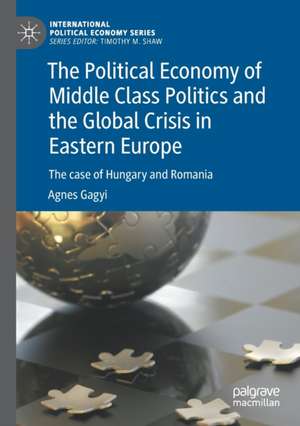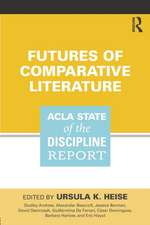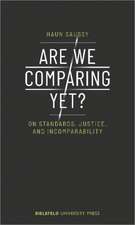The Political Economy of Middle Class Politics and the Global Crisis in Eastern Europe: The case of Hungary and Romania: International Political Economy Series
Autor Agnes Gagyien Limba Engleză Paperback – 11 aug 2022
| Toate formatele și edițiile | Preț | Express |
|---|---|---|
| Paperback (1) | 871.57 lei 43-57 zile | |
| Springer International Publishing – 11 aug 2022 | 871.57 lei 43-57 zile | |
| Hardback (1) | 875.43 lei 43-57 zile | |
| Springer International Publishing – 10 aug 2021 | 875.43 lei 43-57 zile |
Din seria International Political Economy Series
- 20%
 Preț: 751.82 lei
Preț: 751.82 lei - 17%
 Preț: 363.47 lei
Preț: 363.47 lei - 15%
 Preț: 680.00 lei
Preț: 680.00 lei -
 Preț: 420.05 lei
Preț: 420.05 lei - 9%
 Preț: 762.79 lei
Preț: 762.79 lei -
 Preț: 140.78 lei
Preț: 140.78 lei - 20%
 Preț: 690.96 lei
Preț: 690.96 lei - 20%
 Preț: 566.63 lei
Preț: 566.63 lei -
 Preț: 421.92 lei
Preț: 421.92 lei - 17%
 Preț: 490.23 lei
Preț: 490.23 lei -
 Preț: 144.23 lei
Preț: 144.23 lei -
 Preț: 196.85 lei
Preț: 196.85 lei -
 Preț: 277.68 lei
Preț: 277.68 lei -
 Preț: 381.29 lei
Preț: 381.29 lei -
 Preț: 377.34 lei
Preț: 377.34 lei -
 Preț: 381.87 lei
Preț: 381.87 lei -
 Preț: 381.50 lei
Preț: 381.50 lei - 15%
 Preț: 631.27 lei
Preț: 631.27 lei -
 Preț: 405.52 lei
Preț: 405.52 lei -
 Preț: 379.59 lei
Preț: 379.59 lei - 15%
 Preț: 625.98 lei
Preț: 625.98 lei - 15%
 Preț: 631.61 lei
Preț: 631.61 lei - 18%
 Preț: 875.61 lei
Preț: 875.61 lei -
 Preț: 404.18 lei
Preț: 404.18 lei -
 Preț: 325.08 lei
Preț: 325.08 lei -
 Preț: 387.52 lei
Preț: 387.52 lei - 15%
 Preț: 628.89 lei
Preț: 628.89 lei -
 Preț: 383.53 lei
Preț: 383.53 lei -
 Preț: 380.54 lei
Preț: 380.54 lei - 15%
 Preț: 627.61 lei
Preț: 627.61 lei - 15%
 Preț: 633.23 lei
Preț: 633.23 lei - 15%
 Preț: 624.89 lei
Preț: 624.89 lei - 15%
 Preț: 630.83 lei
Preț: 630.83 lei -
 Preț: 379.22 lei
Preț: 379.22 lei - 15%
 Preț: 628.57 lei
Preț: 628.57 lei -
 Preț: 379.04 lei
Preț: 379.04 lei - 15%
 Preț: 626.80 lei
Preț: 626.80 lei - 18%
 Preț: 925.06 lei
Preț: 925.06 lei -
 Preț: 383.53 lei
Preț: 383.53 lei -
 Preț: 330.65 lei
Preț: 330.65 lei -
 Preț: 386.20 lei
Preț: 386.20 lei -
 Preț: 379.22 lei
Preț: 379.22 lei -
 Preț: 379.04 lei
Preț: 379.04 lei - 15%
 Preț: 621.84 lei
Preț: 621.84 lei -
 Preț: 379.96 lei
Preț: 379.96 lei -
 Preț: 384.70 lei
Preț: 384.70 lei - 15%
 Preț: 628.57 lei
Preț: 628.57 lei - 15%
 Preț: 627.11 lei
Preț: 627.11 lei - 15%
 Preț: 630.15 lei
Preț: 630.15 lei - 15%
 Preț: 629.70 lei
Preț: 629.70 lei
Preț: 871.57 lei
Preț vechi: 1062.89 lei
-18% Nou
Puncte Express: 1307
Preț estimativ în valută:
166.80€ • 173.26$ • 138.55£
166.80€ • 173.26$ • 138.55£
Carte tipărită la comandă
Livrare economică 03-17 februarie 25
Preluare comenzi: 021 569.72.76
Specificații
ISBN-13: 9783030769451
ISBN-10: 3030769453
Ilustrații: X, 294 p. 1 illus.
Dimensiuni: 148 x 210 mm
Greutate: 0.4 kg
Ediția:1st ed. 2021
Editura: Springer International Publishing
Colecția Palgrave Macmillan
Seria International Political Economy Series
Locul publicării:Cham, Switzerland
ISBN-10: 3030769453
Ilustrații: X, 294 p. 1 illus.
Dimensiuni: 148 x 210 mm
Greutate: 0.4 kg
Ediția:1st ed. 2021
Editura: Springer International Publishing
Colecția Palgrave Macmillan
Seria International Political Economy Series
Locul publicării:Cham, Switzerland
Cuprins
1.Social movements in Eastern Europe: problems of understanding non-Western contexts.- 2.External integration as internal force: middle class politics and the “politics of backwardness” in Eastern Europe.- 3.Crisis, regime change, movement: comparing mobilization cycles in Hungarian and Romanian constellations of global integration after 1973 and 2008.- 4.Long-term middle class politics and contemporary new left initiatives in Hungary and Romania.
Notă biografică
Agnes Gagyi is Researcher at the Department of Sociology and Work Science, University of Gothenburg, where her current projects look at housing conflicts in Eastern Europe after 2008, and the social conditions of urban green infrastructures in face of the climate crisis. She is a founding member of the Working Group for Public Sociology “Helyzet” in Budapest.
Textul de pe ultima copertă
Contrary to dominant narratives which portray East European politics as a pendulum swing between democracy and authoritarianism, conventionally defined in terms of an ahistorical cultural geography of East vs. West, this book analyzes post-socialist transformation as part of the long downturn of the post-WWII global capitalist cycle. Based on an empirical comparison of two countries with significantly different political regimes throughout the period, Hungary and Romania, this study shows how different constellations of successive late socialist and post-socialist regimes have managed internal and external class relations throughout the same global crisis process, from very similar positions of semi-peripheral, post-socialist systemic integration. Within this context, the book follows the role of social movements since the 1970s, paying attention both to the level of differences between local integration regimes and to the level of structural similarities of globalintegration. The analysis maintains a special focus on movements’ class composition and inter-class relationships and the specific position of middle-class politics in movements.
Agnes Gagyi is a sociologist, working on East European politics and social movements in terms of the region’s long-term integration into world-economic and geopolitical relations. She is Researcher at the Department of Sociology and Work Science, University of Gothenburg, where her current projects look at housing conflicts in Eastern Europe after 2008, and the social conditions of urban green infrastructures in face of the climate crisis. She is a founding member of the Working Group for Public Sociology “Helyzet” in Budapest.
Caracteristici
Speaks about contemporary movements in Eastern Europe as movements of the global crisis of the post-WWII world order Analyzes post-socialist transformation as part of the long downturn of the post-1945 global capitalist cycle Shows how different constellations of successive late socialist and post-socialist regimes have managed internal and external class relations
























